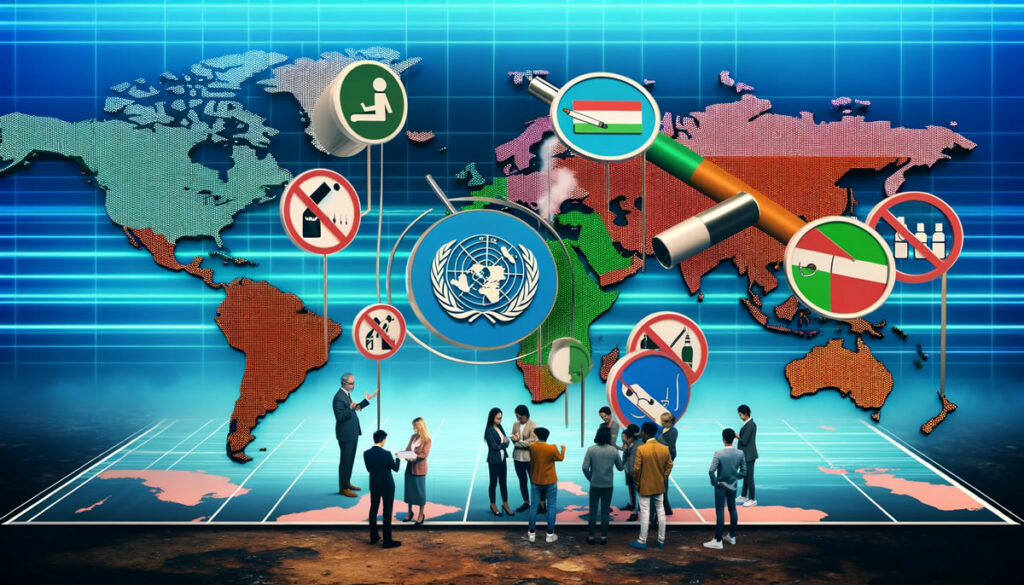The World Health Organization (WHO) has issued a call to action, urging governments worldwide to treat vaping products similarly to tobacco and implement a comprehensive ban on all flavored e-cigarettes. This move has sparked debates and prompted nations to reevaluate their stance on vaping regulations.
The WHO’s Stance and Its Implications
According to a report released by the WHO last year, 34 countries, including Brazil, India, Iran, and Thailand, have already imposed bans on vaping products. However, the organization acknowledges that many nations struggle to enforce e-cigarette rules effectively, resulting in the proliferation of a thriving black market.
The proposed ban, if implemented globally, could pose significant challenges for major tobacco companies that have invested heavily in the development and promotion of alternative cigarette products, such as vaping devices.
A Patchwork of Regulations Across the Globe
While the WHO’s call for a global ban resonates with some nations, others have adopted a more nuanced approach, implementing regulations tailored to their specific contexts and concerns.
Strict Regulations and Bans
Several countries have taken a hard stance against vaping products:
- Australia: Nicotine-containing e-cigarettes are available only with a prescription. The country has been grappling with a surge in illegal disposable vapes and has implemented measures to curb their importation and domestic manufacturing.
- China: As the world’s largest producer of e-cigarettes, China introduced comprehensive laws in 2021 to regulate their domestic use, including banning flavored products and imposing taxes on production, import, and wholesale distribution.
- Japan: Nicotine-containing e-cigarettes are classified as medicinal products, and none have been approved for use yet.
Regulated Markets
Other nations have opted for a more balanced approach, allowing vaping products while implementing regulatory frameworks:
- European Union (EU): The European Commission has set standards for e-cigarettes, including limits on nicotine content and labeling requirements. Individual member states have introduced additional laws governing their use, such as age restrictions and public place bans.
- United States: E-cigarette manufacturers must obtain authorization from the Food and Drug Administration (FDA) to legally sell their products. The FDA considers factors like the potential benefits for smokers trying to quit when evaluating applications.
- United Kingdom: The UK has embraced vaping as a public health strategy, offering starter kits to smokers to help them quit. However, concerns over disposable vapes’ environmental impact and youth vaping have prompted plans for tighter regulations and a potential ban on disposable devices.
The Challenges of Enforcement and Black Markets
Despite the various regulations in place, enforcement remains a significant challenge for many countries. Poor enforcement has led to the proliferation of black markets, where illegal and unregulated vaping products are readily available, undermining the efforts to protect public health and the environment.
Striking a Balance: Public Health, Environmental Concerns, and Personal Freedoms
As the debate surrounding vaping regulations intensifies, governments face the intricate task of striking a delicate balance between protecting public health, addressing environmental concerns, and respecting personal freedoms.
While some advocate for outright bans, citing health risks and environmental impact, others argue for a more nuanced approach that recognizes the potential benefits of vaping as a harm-reduction tool for smokers seeking to quit traditional cigarettes.
Additionally, the issue of personal choice and individual liberties further complicates the discourse, as some argue that adults should have the right to make informed decisions about vaping, provided that appropriate regulations are in place to mitigate potential risks.
Conclusion: A Collaborative Effort for Responsible Regulation
As the vaping landscape continues to evolve, it is evident that a collaborative effort is required to develop responsible regulations that address the concerns raised by the WHO while also considering the unique circumstances and perspectives of each nation.
By fostering open dialogue, conducting comprehensive research, and learning from the experiences of other countries, governments can craft evidence-based policies that prioritize public health, environmental sustainability, and individual freedoms.
Ultimately, navigating the complex landscape of vaping regulations demands a nuanced and balanced approach, one that acknowledges the multifaceted nature of this issue and seeks to find solutions that serve the best interests of all stakeholders.
- Myanmar Enacts Total Ban on E-Cigarettes and E-Shisha - February 25, 2026
- UK Announces Mandatory Vape Tax and Duty Stamps from 2027 - February 10, 2026
- Sri Lanka Travel 2026: Total Ban on Cigarettes & Vapes - February 5, 2026


